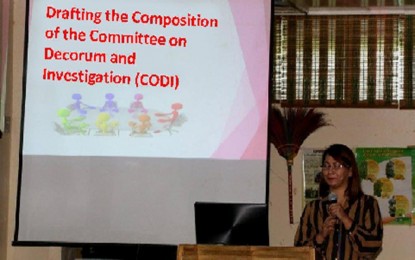
SPECIAL BODY. Legal Officer Esperanza Orig of Mariano Marcos State University discusses the creation of an investigation body to protect students and personnel from sexual harassment in the university. (Photo by Reynaldo Andres)
BATAC CITY-- The Mariano Marcos State University (MMSU) in this city is creating a Committee on Decorum and Investigation (CODI), a special body that will protect students and personnel against sexual harassments (SHs).
Lawyer Esperanza Orig, MMSU Legal Officer, said Thursday the creation of an investigation body is in compliance with Civil Service Commission (CSC) Resolution No. 01-0940 and CHED’s Memorandum No. 01 series of 2015, requiring all state colleges and universities (SUCs) throughout the country to create their own CODI.
"CODI’s main function is to investigate and act complaints of sexual harassment, submit reports and recommendations to the disciplining authority for decision, and promote discussions about SHs in the MMSU system," Orig explained as she added it also aims to increase awareness and understanding about acts of sexual harrassments and how this can be prevented.
The CODI is composed of at least one representative from the administration department, sports trainers or coaches, teachers, instructors, professors, and students or trainees.
“HEIs (Higher Education Institutions) should ensure that the necessary provisions on sexual offenses and their corresponding penalties are included in their collaborative arrangements with partner agencies relating to practicum or on-the-job training programs,” the order added.
The CSC emphasized that MMSU may formulate its own rules and other matters related to the functions of the CODI.
Its members shall have a fixed term of at least two years.
Prior to the creation of the Committee, human rights educators in the University were oriented on gender and development-related laws and human rights issues, including the implementing rules and regulations of anti-sexual harassment in a planning workshop held on December last year.
The drafted guidelines were validated last April so that the administrative disciplinary rules on sexual harassment for MMSU will become effective upon the approval of the CSC.
As stipulated in the law, sexual harassment may be committed through malicious physical contacts, lured remarks such as obscene or abusive jokes and lewd talks, use of obscene photos, graphics, and letters, among others. This could be committed in workplaces and school premises.
An offense can be filed by the victim through a written complaint and under oath with the Office of the University President.
If the complaint is sufficient in form and substance, it would be considered and resolved immediately.
The accused, if proven guilty, would be fined or suspended not exceeding 30 days, or even dismissal from work or school depending on the intensity of the offense committed. (PNA)
